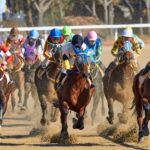This article contains third-party links.
Horse racing betting has a special blend of tradition, excitement, and strategy. It’s also huge business here in the UK, with the sports betting industry worth almost $5 billion. Understanding the psychological dynamics that come into play when horse racing wagering shows a complexity of motivations, biases, and behaviours that shape betting decisions – and it’s pretty fascinating stuff.
The Role of Emotion in Horse Racing Betting
Emotions play a big role in the world of horse racing betting and they help to influence many a bettors’ decisions and, ultimately, the outcomes. The anticipation leading up to a race, the adrenaline rush as the horses thunder down the track, and the elation or disappointment at the finish line all contribute to the emotional rollercoaster experienced by bettors.
Positive emotions such as excitement and anticipation can sometimes lead to impulsive betting behaviours, with bettors chasing the thrill of victory and the potential for significant financial gains. However, it’s important not to get too carried away and perhaps even do your homework before placing a bet instead of running with your gut instinct. The best horse racing betting websites will have lots of amazing bets and sign-up bonuses for those first-time players, according to iGaming expert Peter Addison, so you might be tempted to go with the first bet you see. But, a little research before you do is never a bad thing.
Cognitive Biases and Heuristics in Horse Racing Betting
Cognitive biases and heuristics represent inherent mental shortcuts that can lead to errors in judgment and decision-making in horse racing betting. For example, confirmation bias may cause bettors to seek out information that confirms their preconceived notions about a particular horse or jockey while ignoring contradictory evidence. Similarly, availability bias may lead bettors to overvalue recent race performances or media coverage, while overlooking less salient factors such as track conditions or horse form. It can, therefore, be a tricky balancing act.
These cognitive biases can distort bettors’ perceptions of risk and reward, leading to suboptimal betting decisions. Recognising the prevalence of cognitive biases in horse racing betting allows stakeholders to implement interventions aimed at promoting more informed and rational decision-making among bettors, ultimately enhancing the overall integrity and sustainability of the sport.
Risk Perception and Decision-Making in Horse Racing Betting
Risk perception plays a fundamental role in wagering decisions in horse racing. Each race presents a brand new set of risks and uncertainties; from the unpredictability of the horses’ performance to the influence of external factors such as what the weather is going to be like or track bias. Individual bettors may perceive these risks differently based on their own cognitive processes, personal experiences, and situational factors.
Some bettors may adopt a risk-averse approach, favouring safer bets with lower potential returns to minimize losses. Others may embrace risk, seeking out higher odds and greater rewards despite the inherent uncertainty. Understanding how bettors perceive and manage risk allows stakeholders to tailor their offerings to meet the diverse needs and preferences of the general betting public.
The Gambler’s Fallacy and Chasing Losses in Horse Racing Betting
The gambler’s fallacy and the phenomenon of chasing losses are very common pitfalls that bettors encounter in horse racing betting. The gambler’s fallacy, which involves the erroneous belief that past outcomes influence future results, can lead bettors to make irrational betting choices based on perceived patterns or trends. For example, a bettor may believe that a horse is “due” for a win after a series of losses, despite the outcomes of previous races having no bearing on the horse’s performance in the current race. It’s pretty safe to say that many of us will have been here at one stage or another.
On the other hand, chasing losses happens when bettors attempt to recover previous losses by increasing the size or frequency of their bets. This can lead to a downward spiral of escalating stakes as the gambler attempts to chase either breaking even or turning a profit.
Conclusion
The psychology of betting in horse racing is a fascinating subject area, and we have only touched on the basics. By exploring the interplay between psychology and horse racing betting, we can gain invaluable insights into the motivations and behaviours that drive this timeless pursuit of excitement and uncertainty.
Michael specializes in journalism, digital content production and social media management. He has a passion for numerous sports including football, horse racing and ice hockey. Michael currently works on a freelance basis, producing daily content for various outlets within the sports industry.





